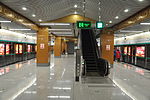2008 Beijing Drum Tower stabbings
2000s in Beijing2008 Summer Olympics2008 murders in ChinaAmerican people murdered abroadAttacks in China in 2008 ... and 5 more
Crime in BeijingDeaths by stabbing in ChinaMass stabbings in ChinaMurder–suicides in ChinaStabbing attacks in 2008
On August 9, 2008 in the People's Republic of China, two American tourists and their Chinese tour guide were stabbed at the historic Beijing Drum Tower; one of the tourists was killed. The assailant then committed suicide by jumping from the tower. The incident occurred during the 2008 Summer Olympics in Beijing. The incident has been described as isolated since attacks on foreigners while visiting China are rare.
Excerpt from the Wikipedia article 2008 Beijing Drum Tower stabbings (License: CC BY-SA 3.0, Authors).2008 Beijing Drum Tower stabbings
Zhonglouwan Hutong, Dongcheng District Andingmen (首都功能核心区)
Geographical coordinates (GPS) Address Nearby Places Show on map
Geographical coordinates (GPS)
| Latitude | Longitude |
|---|---|
| N 39.939444444444 ° | E 116.38963611111 ° |
Address
北京鼓楼
Zhonglouwan Hutong
100010 Dongcheng District, Andingmen (首都功能核心区)
Beijing, China
Open on Google Maps










